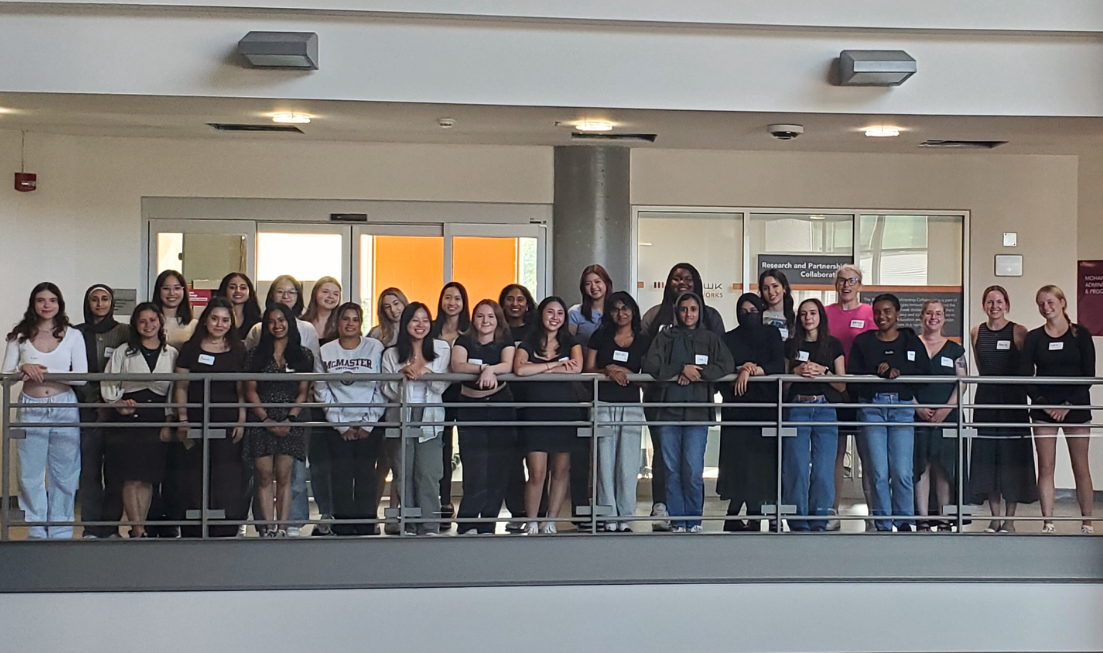‘This program emphasizes the importance of being a good person within the medical industry’

“As a disabled student, I’ve noticed that a lot of health-care spaces don’t really include our perspectives and see us only in the role of being a patient. For me, the IRH program was an opportunity to learn and interact with a curriculum that is cognizant of that historical bias, and to contribute to bringing disabled voices to the table.” — Yameena Zahid, Integrated Rehabilitation and Humanities program
For Yameena Zahid, the start of the school year also marked her start in a program that is the only one of its kind in the world.
Zahid and nearly 30 other undergraduates are in McMaster’s first cohort of the unique Honours Health Sciences, Integrated Rehabilitation and Humanities (IRH) program, offered through a unique collaboration between the faculties of Health Sciences and Humanities.
The curriculum contains a unique blend of coursework and experiential learning that reflects the complex nature of health and well-being.
“Being able to look at the humanities and history of health care through a critical lens means being able to provide care that sees both patients and practitioners as more than just datapoints,” Zahid says.
“I believe that health care is inherently tied to the humanities, and that effective care systems require us to learn from our past in order to look towards the future.”
Students in the IRH program will learn a combination of the key principles and values of caring for others and those of rehabilitation and health sciences, agrees classmate Ruth Nahmad Hamui.
“I aspire to be a doctor one day, a role and responsibility that requires the ability to interact and connect with others and the world around me,” Hamui says.
“The IRH integrates those core values of mine in such a beautiful program where I have the opportunity to learn about others, to learn to value others, because at the end of the day the responsibility of a doctor is not just to heal, but to recognize that you are helping an individual with a whole world.”
For Harleen Kaur, the program resolved a struggle to find courses that gave her a sense of purpose and resonated with her values.
“I felt so out of place until I discovered what this program is, and I felt instantly drawn to it and the fact that this program emphasizes the importance of being a good person within the medical industry,” Kaur says.
“It’s so important to know how to speak to patients, how to be empathetic and kind, while delivering quality care to patients.”
A unique journey across disciplines
With its emphasis on small-group learning and experiential learning in a practicum setting, the IRH aims to equip student to meet the ever-changing health needs of communities.
Next year, students will participate in a 60-hour supervised placement, where the focus will be on serving the community while building and honing practical skills.
They will bring their learnings from their practicum back to the classroom, adding depth and experience to their coursework.
By the time they graduate, IRH students will have the skills and experience to address the health, social and human needs of individuals and their communities, says program director Brenda Vrkljan, a professor of Occupational Therapy in the School of Rehabilitation Science.
“Health is a complex phenomenon; by working across disciplinary boundaries – from basic science training in anatomy and physiology to understanding what matters most to people, families and communities – we will graduate learners who not only see the big picture but are outstanding team players and communicators,” says Vrkljan.
“Their contributions will be vital in shaping a more inclusive and empathetic approach to health and human services.”
The students are embarking on a unique journey, says Pamela Swett, dean of the Faculty of Humanities.
“It will help them grasp the complexities of health and well-being with creativity, empathy, curiosity, and a fundamental understanding of what it means to be human.
“I can’t wait to see what this pioneering group of students is able to achieve.”
Learn more about the IRH program and applications for the next cohort on the program’s website.

